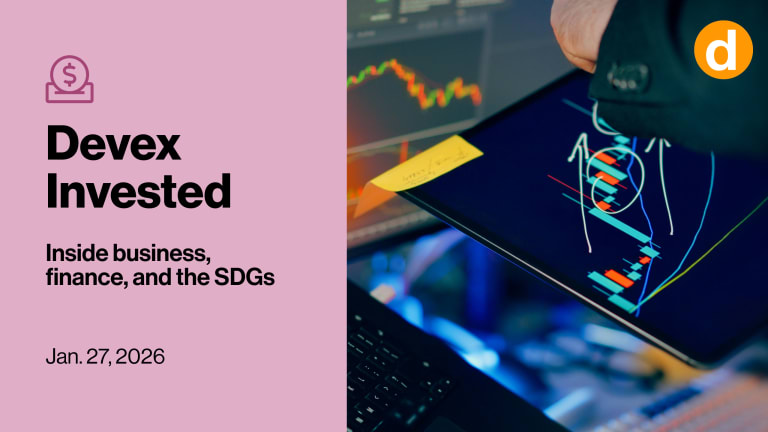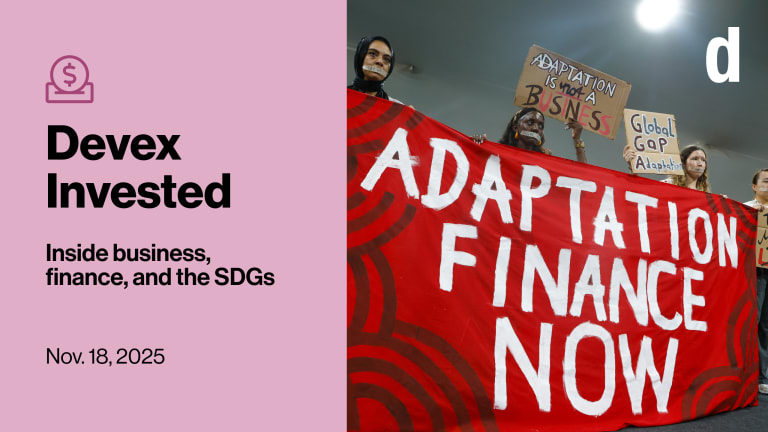
Few ideas in global development are more hackneyed than the hope that private capital can turn billions of public dollars into trillions in private investment for worthy causes. But increasingly, that credo is being questioned — and not just by NGOs.
Example 1: We sat down in Paris recently with Carsten Staur, the chair of the OECD’s Development Assistance Committee, the 32-member group that defines and measures what counts as official development assistance.
As we noted in August, Staur has also been critical of donors’ slow efforts to deliver on the private sector mobilization that underpinned the 2015 Addis Ababa agenda on Financing for Development.
With the successor event to Addis planned in Seville, Spain, next June, Staur is calling for a closer look at what went wrong. So far he sees two main culprits:
1. A changed geopolitical and geoeconomic environment: “COVID-19, the credit crunch with interest rates, and you can see that there has been a decline in foreign direct investment in recent years,” he tells me.
2. Speed: Donor governments have taken longer than expected to create blended finance instruments.
Still, Staur says now is the time to focus on the elements that are “picking up traction,” such as guarantee schemes, as well as green and blue bonds.
“I would say that the glass is more half full than it's half empty,” he tells me, while admitting that “it has taken time to get the water into the glass.”
Read: Amid the cuts, why the OECD development chief is optimistic about aid (Pro)
+ Not yet a Devex Pro member? Start your 15-day free trial today to access all our expert analyses, insider insights, funding data, exclusive events, and more. Check out all the exclusive content available to you.
Bridgetown 3.0
The reappraisal of private sector mobilization is also apparent in the latest version of the Bridgetown Initiative. Launched in 2022 as an effort to rethink the global financial system to relieve debt and increase access to climate finance, the plan’s third iteration was released in late September.
Devex’s new climate reporter Jesse Chase-Lubitz (follow her on X) has a handy primer on how the initiative, spearheaded by the government of Barbados, is evolving.
Whereas Bridgetown 2.0 called for mobilizing $1.5 trillion per year from private sector investment for green and just transformations, for instance, 3.0 asks for “at least $500 billion.”
“I wonder if that [decrease] serves as a recognition of how hard it can be to actually reorient private financing flows,” Noah Zucker, an assistant professor at the London School of Economics, tells Jesse. “The original Bridgetown Initiative was really very, very ambitious, and I think it was quite successful in changing the terms of the debate … but there may be more thought given what is actually practical given the constraints we’re working with.”
Read: Barbados' Bridgetown 3.0 recommends taxing emitters and the superrich
Background: How the Bridgetown Initiative envisions global financial system reform (Pro)
FMO’s FOMO
One attempt to “crowd in” the private sector that we have been following closely is the European Commission’s foray into budget guarantees, designed to de-risk investments by mostly European DFIs in the hope of coaxing them into frontier markets.
The European Court of Auditors failed to see much impact four years ago, and it is still relatively early days when it comes to judging the scheme’s overall effectiveness.
But we asked the Netherlands development bank FMO recently how it views the value of the commission’s guarantees. The answer from Chief Investment Officer Huib-Jan de Ruijter was interesting:
FMO is now looking to do a follow-up to its ventures program, which invested in fast-growth-potential, tech-enabled companies across sectors like energy and agriculture in countries such as India, Nigeria, Kenya, Ghana, and South Africa.
In hindsight, de Ruijter says FMO could have made the investments without the help of an EU guarantee. But, he says, that’s precisely why the guarantee was useful, because it allowed FMO to identify where “perceived risk is higher maybe than real risk.”
“At the outset, I think the guarantee was really needed,” he says. “If you look in hindsight, we could have done it without [it].”
From the archives: Auditor says EU's guarantee experiment still just ‘hopes and expectations’
Green shoots
Lastly, when it comes to private sector mobilization for agriculture, two experts have laid out how to get more blended finance into the sector.
In an opinion piece for Devex, Federica de Gaetano, from the Italian Agency for Development Cooperation, and Bruce Campbell, from the Swiss Agency for Development and Cooperation, give their prescription. Namely:
1. Invest in the “missing middle”: Local investors, with their extensive networks and specialized expertise, are well-positioned to reach SMEs. However, they need incentives.
2. Enable DFIs to take more risk: Notably, dedicated funds would allow them to take higher-risk loans with defined targets on sustainable food and agriculture.
3. Share data and knowledge: The Thematic Working Group on Sustainable/Blended Finance for Food Systems, established in March this year, is a good place to start.
4. Challenge the focus on leverage ratios: Leverage ratios must be accompanied by a comprehensive approach that considers additionality.
Opinion: How blended finance can catalyze private capital for agriculture
Spotlight on gas
Having finally gotten the green light from its shareholders last year, the European Bank for Reconstruction and Development is now scoping out its long-awaited expansion into sub-Saharan Africa. Benin, Côte d’Ivoire, Ghana, Kenya, Nigeria, and Senegal are the countries where the bank says it would like to work.
But work on what? Unlike the European Investment Bank, EBRD would still consider investment in gas projects in some limited circumstances.
EIB announced it was getting out of gas in 2019, but that strained ties with countries like Senegal, whose then-President Macky Sall almost blew up the 2022 summit between the European Union and African Union over the issue.
Now EBRD is on the scene, what is its approach?
“We've not ruled gas out,” Harry Boyd-Carpenter, managing director for climate strategy and delivery at EBRD, told Jesse in London last month.
He recalled that EBRD’s energy policy allows for gas investments where they are aligned with the goals of the Paris Agreement and where they actively accelerate decarbonization. There are no such projects foreseen in sub-Saharan Africa yet, but should a proposal emerge that displaces heavy fuel oil and helps foster renewable energy use, “then we would look at it very seriously,” he said.
ICYMI: EBRD president says bank must continue to fund some new gas projects
Your next job?
Lead Corporate, Country, and Thematic Evaluation Specialist
Islamic Development Bank
Saudi Arabia
What we’re reading
Former carbon offsetting executive Kenneth Newcombe charged in New York with multimillion-dollar fraud. [The Guardian]
United Kingdom Prime Minister Keir Starmer was advised to bring back the aid department — but said no. [Devex Pro]
Andrew Mitchell, the former U.K. development minister, claims U.K. tax havens use royal connections to obstruct efforts to stamp out dirty money. [Devex]








